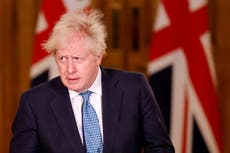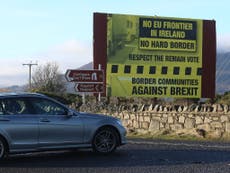The horrific reality of Brexit hasn’t changed in four years – this deal won’t alter that
For politicians like Boris Johnson, this was always strategic – to demand the purest EU exit possible, the ideological over the pragmatic, and to hope for the best

After four and a half long and torturous years, Brexit can finally get started. The reality of it didn’t change once in all that time, and it hasn’t changed now.
That it took so many shapes and forms and inflicted so much psychological misery was purely because a long and dismal line of Conservative governments and politicians either couldn’t understand, couldn’t face or couldn’t tell the truth about its blunt simplicity.
There was so much rubbish spoken, so loudly and for so long, that it came to form its own mad world of denial, which many a Tory will go on living in, quite possibly for the rest of their days.
The final, almost irreconcilable issue arguably demonstrates its reality best. There is a patriotic certainty, a simple truth, in the notion that no one but the British should have the right to catch fish in British waters. But then there is the complexity beyond it.
That British mouths don’t want to eat all the fish caught in British waters, so it must be sold to other European countries. That grants leverage to the buyer.
Solving these complex interdependencies in the mutual interest of all parties was the boring work of boring bureaucrats in Brussels, doing the boring work of life in the modern world, which Britain decided to turn its back on a paroxysm of nationalistic emotion it was then unable to manage.
Hard, soft, green, smooth, clean, chaotic, red, white and blue – none of these things were real. They were only ever two types of Brexit on offer.
One involved staying closely aligned to EU rules and regulation but powerless to influence them – a pointless Brexit.
The other involved diverging from EU rules at massive economic and geopolitical cost, to be compensated for by upsides that are not yet real, but may involve some kind of competitive edge in industries of the future that have not yet been invented – a fantasy Brexit.
Inside this mess was the mess within the mess that was Northern Ireland. Only the first, the pointless Brexit, could keep the United Kingdom together in any meaningful sense of the word.
And inside the mess within the mess was an even messier mess, which was that an almost poetically dreadful general election result in June 2017 handed temporary but massive power to a Northern Irish political party that wouldn’t tolerate anything less than both at once – the pointless fantasy Brexit. It did not come to pass.
It is arguably no less stupefying now than it was years ago, to recall that the UK’s first Brexit secretary, David Davis, really did think that he would negotiate Brexit as a collection of sector by sector and country by country bilateral deals. That in his first day in the job, he would simply fly to Berlin and do a deal with the German car industry.
At that time, Nigel Farage was stating very matter of factly that Angela Merkel would have no choice but to give the UK all the benefits of single market membership and none of the costs, because without British buyers, her manufacturing sector would go out of business and the German people would sweep her from office.
When this turned out to be pure fantasy, fresh fantasy came along to replace it. The referendum had happened now, and David Davis would promise that before the UK formally left the European Union, it would already have signed free trade deals with China, India, the United States and everywhere else in between, creating a free trade area “10 times larger than the European Union.”
As trade tends to be measured in economic value rather than geographical area, on the basis that, for example, Japan is a more important trading area than Antarctica, despite it being roughly 37 times smaller, it had to be pointed out to Mr Davis that a trading area “10 times larger than the EU” would be larger than Earth itself. Mr Davis chuckled.
The Theresa May years were a tortured, impossible mess because so was she. So desperate was she to avoid a row in her cabinet, she accidentally avoided making a choice as well, choosing instead to say “Brexit means Brexit” over and over and over again as a kind of psychological coping strategy to get through to the next catastrophe, usually waiting a few minutes down the line.
She went on saying “no deal is better than a bad deal” even after having realised there was absolutely no deal more bad than no deal. After that point, she found herself negotiating to avoid no deal while simultaneously using the threat of no deal as her negotiating leverage; a turkey negotiating the cancellation of Christmas by threatening to ride off in Bernard Matthews’ limo.
For years the Brexiteers had complained about being part of a union that was stubborn, sclerotic and inflexible, and suddenly here these same people were, seeming genuinely to believe that it had been made more nimble, more reasonable and more efficient by leaving it. That it would somehow become the only union of any kind anywhere on Earth that would be more favourably disposed to the needs of others than its own members.
It would be this that would lead Theresa May, for reasons that will never be understood, to fly herself and gather an audience to a church in Florence and, standing in front of a large piece of white cardboard she had also brought with her, tell the EU that it must be flexible, it must be creative, it must find a solution she couldn’t face trying to find herself.
The invitation was declined.
The selected lowlights of the May years are scarcely worth the keystrokes, not least as they can be summed up in the space of one evening, in spring 2019, when MPs spent around an hour or so, patiently walking through the division lobbies to say no to Theresa May’s withdrawal agreement, and no to every other alternative that was put before them. The Brexit gods decreed it not farcical enough that it should take place on April Fools Day. They would also summon forth the twenty two naked buttocks of eleven climate change protestors, and superglue them to the glass window of the public gallery.
What did for Theresa May, in the end, was that the best she could hope to achieve was a fantasy Brexit for Great Britain and a pointless Brexit for Northern Ireland, and that was something to which “no British prime minister could ever agree.”
In fairness to her, it was true when she said it, in the sense that Boris Johnson had not yet been prime minister, he being the only one who would ever agree to it, which he then did.
If Johnson made any meaningful contribution towards advancing the process, it was to say yes to the deal Theresa May had rejected. He handed Northern Ireland its pointless Brexit while looking Northern Irish business people in the eye and telling them bare faced lies – that they were getting the same fantasy as everybody else.
These new state of affairs, this new Britain, will take a while to reveal its full horrors, but they have already begun.
To take but one small example, right now, on the website of a small, brilliant, family-run plant nursery based in Newcastle, you will find a customer notice which explains that, with real sadness, from 1 January next year, they will no longer be able to accept orders from customers not even in the EU but in Northern Ireland.
This is the deal that, to take another small example, the MP for Romford, Andrew Rosindell, has backed with great enthusiasm. Andrew Rosindell has officially renamed his constituency office Margaret Thatcher House. It would not be far fetched to describe the place as a shrine to her.
In his head, it is in her honour that he has restored greatness to Great Britain through the medium of Brexit. But the form it has taken means a plant nursery in Newcastle can’t sell products to their fellow British citizens in Northern Ireland, whose Britishness Thatcher quite rightly saw fit to protect with the lives of British soldiers.
So what? It’s only one small business, and it’s only a smallish bit of its customer base, probably. But all these increments will add up to something. Smaller businesses, poorer people, worse schools, worse hospitals. Fewer opportunities, less to aspire for. A worse life to live out, in a worse country. And all this, done by people who call themselves Tories, but are actually no more than right-wing oddballs with a badly thought out big idea that went too far.
Of course, not all of them call themselves Tories. The only place the fantasy Brexit ever existed in anything that could vaguely be described as reality were on the very long blogposts of Dominic Cummings, who was never a Conservative to begin with. In his view, these torturous negotiations, which are now at a kind of end, never mattered at all. What matters is what was meant to come next, smashing up the civil service, investing billions of public money in artificial intelligence and other proto-industries.
In some ways it’s especially heartbreaking that he was found to be too personally egregious to still be around to do all the things that Brexit was actually for. But he was around for long enough to spend £500m of public money on a weird satellite company that went bust around 10 seconds after he was warned it would do. So perhaps it’s for the best.
It does leave us with a prize that nobody especially wanted or knows what to do with. Four and a half years ago, many a Brexiteer would have been wholly content with some kind of associate membership of the EU, an EEA-style halfway house. By mid 2017, such things were considered akin to treason.
That the demands of the Brexit true believers hardened at every opportunity should come as no surprise. They are, all of them, pure and professional politicians, and none more so than Farage, his continual protestations to the contrary being proof enough. It was always for them, strategic. To demand the very purest Brexit possible, the ideological over the pragmatic, and to hope for the best.
That reality slowly found its way out to meet them probably took a few of them by surprise, but it shouldn’t have done. Johnson was always one of them. A fantasist, a columnist, a cakeist, and now they all have their wish.
Four and a half years is too long a time to repeat the platitude of being careful what one wishes for. They already know. Though it is especially miserable for those who never wished for it in the first place, and who, even now, simply cannot make peace with it.





Join our commenting forum
Join thought-provoking conversations, follow other Independent readers and see their replies
Comments